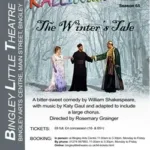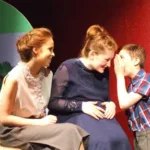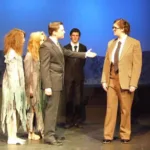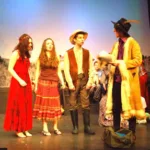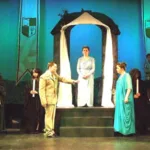Season 65 Kaleidoscope – The Winter’s Tale by William Shakespeare
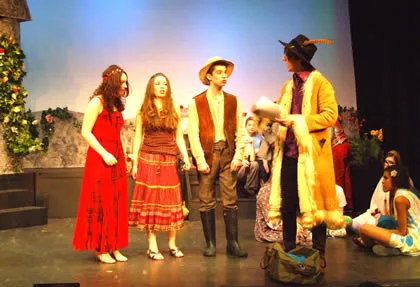
Directed by
Cast
SICILIA
LEONTES, King of Sicilia – JOSLAN SCHEREWODE
HERMIONE, his wife – ELEANOR EDWARDES
MAMILLIUS, their son – ISAAC HARRISON
PERDITA, their daughter – NATASHA FOSTER
CAMILLO, a nobleman – ELLIOTT MATTHEWS
ANTIGONUS, a nobleman – ELLIE BUCHANAN
PAULINA, his wife – MARISA DOLAN
CLEOMINES, a nobleman – KATHARINE BRINKWORTH
DION, a nobleman – MARTHA WILSON
EMILIA – ROSANNA LOACH
Other LADIES of the Court – ALICE ROBERTS, SOPHIE MILLER, ROSALEEN MONTAGUE-VAUGHAN, CHLOE MATHER, HANNAH WILKINSON, ALICE MAYNARD, SOPHIE TANKARD
MARINER – STEVEN KEOGH
Other LORDS – CHRISTIAN BEAUMONT, JAMES HUNTINGTON
OFFICERS – SAMUEL BROWN, JACOB LEEMING
GUARD – ELLIOT MATHER
GAOLER – MILLIE JAKOB-HALL
NURSEMAID – MAYA GEORGE
SERVANT – SAMUEL PERKINS
JEALOUSY – DAISY BENSON, ELIZABETH JONES
BOHEMIA
POLIXENES, King of Bohemia – JACK SMIDDY
FLORIZEL, his son – OLIVER RIBCHESTER
ARCHIDAMUS, noblewoman – ROISIN ELLIS
SHEPHERD – MATTHEW PERKINS
SHEPHERD’S Son – JUDE CONNOLLY
AUTLYCUS – PETER HARDY
MOPSA – STEPHANIE LYMAN
DORCAS – MILLIE SCHEREWODE
SHEPHERD’S SERVANT – JACOB LEEMING
Synopsis
Winter, irrational jealousy, an abandoned baby, a Delphic oracle, a trial and sudden death followed by Spring, a love story, a sheep shearing festival, an elopement, a reunion and a miracle.
Leontes, king of Sicilia, accuses his pregnant queen, Hermione, of infidelity with his old friend, Polixenes, king of Bohemia. Polixenes flees, Hermione is imprisoned and when the baby is born, Leontes orders that his daughter be taken and abandoned. His cruel behaviour results in his son’s death and Hermione’s collapse. Believing his wife, son and baby daughter are all dead, Leontes repents. Meanwhile the baby girl survives, is brought up by shepherds in Bohemia and sixteen years later meets Florizel, the son of Polixenes. Love triumphs, bringing forgiveness and regeneration.
Directors Notes
From the first I realised that if Kaleidoscope was to perform “The Winter’s Tale”, it was important to edit the play. I was determined to keep the original language, but I knew that I needed to cut some of the speeches in order to make the script more manageable for those less familiar with Shakespeare, including some of the cast. Obviously the cuts speed up the action at times and so for instance the rapid development of Leontes’ irrational jealousy is accentuated. I hope that those who know the play well will not feel that I have ruined their enjoyment by omitting their favourite lines. The other factor in the editing was the need to involve a very large cast. I have done this in three ways: two actors personify Leontes’ jealousy, many more people share the lines given to Lords, Ladies and Servants and I have extended Shakespeare’s Chorus, TIME, by introducing the Clowns. I chose the 1950s and 60s as the time settings for the play because I wanted to use two periods divided by about sixteen years, where the earlier period conjured up a more formal time, rooted in the past, while the later period suggested freedom and a “New Age”. My choice is not original but I think it works. Finally the locations. As in many of Shakespeare’s plays which are apparently set in foreign countries, much of the action could really be taking place in England. We have therefore made no attempt to suggest either Sicily or Bohemia but simply two countries separated by sea. There are also a number of inconsistencies and anachronisms, Apollo’s Oracle being one of them. Such things certainly didn’t worry Shakespeare’s audiences; I hope they won’t worry you either.
In choosing plays for Kaleidoscope we have always tried to find something that was different from what we had done before and that was demanding but accessible. This production has certainly proved demanding, but we have also had a great deal of fun with the lighter sections and the music, while also enjoying the opportunity to attempt the more dramatic scenes. The Cast has worked very hard and has been wonderfully supported by all the back-stage teams. I would like to thank them all and to hope you enjoy the production.
THE WINTER’S TALE
The Winter’s Tale, written towards the end of Shakespeare’s career, is usually grouped with Cymbeline and The Tempest. Sometimes referred to as “problem plays”, they do not fit happily into the groups which usually categorise Shakespeare’s plays: Comedies, Tragedies and Histories. Sometimes they are referred to as Romances or Tragi-comedies and certainly The Winter’s Tale combines Tragedy and Comedy. The transition is quite abrupt and there is little blending; the two halves of the play sharply juxtapose the two genres. The themes form the links. We are reminded of the healing power of “Time”, that grieving and penance are redeemed by forgiveness and love and that age can be regenerated by youth. This is not the place however for a long critical essay. Suffice it to say that essentially the play is a story and as such combines elements of the traditional Fairy Tale.


